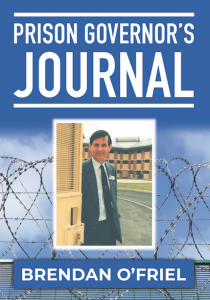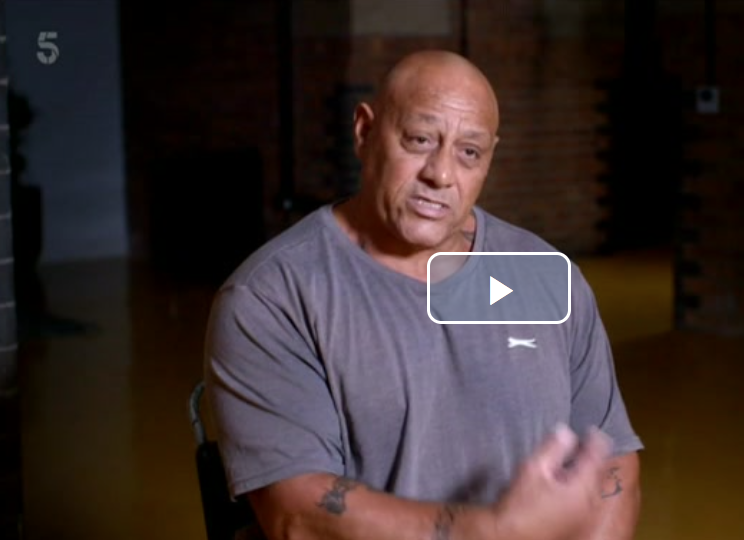by Brendan O’Friel
“Prison Governor’s Journal” (PGJ) – which I published in April 2021 – describes critical episodes in recent penal history in England and Wales.
The book aims to provide an “insider" view from an experienced Prison Governor who was also Chair of the Governors’ Representative Organisation for many years.
The part played by the media is one of the themes running through PGJ: readers of “ViewFinder” - therefore - may find much of interest in the influence the media exerted as the prison service stumbled from one crisis to the next.
In 1980, Rex Bloomstein’s documentaries on “Strangeways” opened up one of the largest prisons in England to remarkably detailed television scrutiny. The series revealed extreme overcrowding, very poor conditions and the lack of hope for prisoners and staff. Despite the revelations, little was to change at Strangeways in the immediate wake of the airing of the programmes.
Prison Governors had become increasingly concerned about conditions in prisons. The deterioration in the prison system began around 1946 – under the avalanche of prisoners committed to custody by the Courts. The prison population quickly rose from around 15,000 reaching 30,000 in the 1960s. Despite heroic efforts to provide additional accommodation, prisoners were soon sleeping in overcrowded cells in dreadful conditions.
To accommodate the additional prisoners, bunk beds were installed in prison cells, hugely reducing the limited space within the cell. The use of upper bunks also increased the danger of prisoners being injured through falling off the top bunks, a danger said to have increased significantly with the greater availability and use of more dangerous illegal drugs in recent years.
Perhaps the worst problem was the combination of overcrowding with the lack of in-cell sanitation. Prisoners had no access to toilets within cells but had to defecate and urinate into either chamber pots or buckets. Overcrowding of cells substantially worsened what was already a deplorable situation, it meant that prisoners were compelled to relieve themselves in front of their cell mates. This was unpleasant and degrading for all three prisoners in an overcrowded cell.
When cells were opened the following morning, the contents of buckets and chamber pots then had to be emptied out in the nearby “recesses” – the infamous “slopping out” procedure. But recesses were so inadequate that 40 prisoners often had to share one toilet between them. Cleaning of used chamber pots and buckets was very difficult and hygiene standards were at the best variable and often very poor.
Until 1977, Governors felt unable to speak out about the issues in prisons. There was doubt as to whether Governors were permitted to speak publicly about their work – would any statement be in breach of the Official Secrets Acts?
But the pressures on the prisons became so great that the Governors representative organisation went public – the start of a long process of exposing the realities of prison conditions to a much wider audience.
As Chair of the Governors from 1977, I was involved in many media interviews and related work. An example is the interview I gave on 30th April 1980 as I moved from Deputy Governor of Birmingham’s Winson Green Prison to take charge of Featherstone Prison at Wolverhampton. This was largely about the dreadful conditions arising from overcrowding.
As Chair of the Governors, I decided to try and ensure that any media coverage was balanced so I agreed to talk about the incident to the BBC. This was the first night of BBC’s “Newsnight” programme and the resulting interview can be found here.
Ten years later on 1st April 1990, as Governor of Strangeways, I found myself facing the worst riot in UK prison history. For the first few days I was heavily involved in managing the riot. A huge media presence developed quickly outside Strangeways and the Prison Service was unable to respond adequately.
On 4th April I gave the first of seven media Conferences and the raw emotion of the events can be seen in the questions and my answers.
The disturbance was brought to an end on April 25th and on 27th April I gave a final news conference which provided an opportunity to reflect on what had taken place.

In my book, I raise a number of “unanswered questions” arising from many years of prison crises. While I am able to suggest some answers, I strongly advocate further research into a number of these topics.
One example is the failure of successive Governments over many decades to grapple with the problems of prison overcrowding. I turn the spotlight on how overcrowding began – the lack of formal decisions and discussion at senior level to recognise and address the problem. Even more surprising, is the lack of interest either in Parliament or the media as the prison overcrowding crisis became established.
Another example is the controversy over the failure to retake Strangeways on the 2nd April 1990. This failure was not at first recognised by the media. Towards the end of the riot it became a “hot” issue. The Woolf Report following the riot provides a detailed analysis of what took place but there remain some answered questions which I identify in Prison Governor’s Journal.
So there are many prison issues awaiting researchers attention – and it is only by learning from what has gone wrong in the past that we will build a better and more effective penal system.
More about PGJ can be found on www.prisongovernorjournal.com
Brendan appears in the Channel 5 documentary Strangeways Riot: 25 Days of Mayhem which gives an hour by hour account of the siege.
About the Author
Brendan O’Friel served in HM Prison Service from 1963-1996. He was Governor of Strangeways, Risley and Featherstone Prisons. He was Chairman of the Prison Governor’s Association from 1990-1995.
